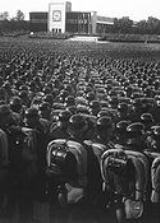|
1945
|
|
2.5.1945
World War II: General Douglas MacArthur returns to Manila. |
|
2.13.1945
World War II: The siege of Budapest concludes with the unconditional surrender of German and Hungarian forces to the Red Army. |
|
2.21.1945
World War II: Japanese Kamikaze planes sink the escort carrier Bismarck Sea and damage the Saratoga. |
|
2.23.1945
World War II: During the Battle of Iwo Jima, a group of United States Marines and a commonly forgotten U.S. Navy Corpsman, reach the top of Mount Suribachi on the island and are photographed raising the American flag. The photo would later win a Pulitzer Prize and become the model for the national USMC War Memorial. |
|
3.16.1945
World War II: The Battle of Iwo Jima ends but small pockets of Japanese resistance persist. |
|
3.21.1945
World War II: British troops liberate Mandalay, Burma. |
|
4.1.1945
World War II: Battle of Okinawa|Operation Iceberg
|
|
4.4.1945
World War II: American troops liberate Ohrdruf forced labor camp in Germany. |
|
4.11.1945
World War II: American forces liberate the Buchenwald concentration camp.
|
|
4.26.1945
World War II: Battle of Bautzen (1945)|Battle of Bautzen
|
|
5.2.1945
World War II: Fall of Berlin: The Soviet Union announces the capture of Berlin and Soviet soldiers hoist their red flag over the ''Reichstag'' building. |
|
5.7.1945
World War II: General Alfred Jodl signs unconditional surrender terms at Reims, France, ending Germany's participation in the war. The document takes effect the next day. |
|
7.5.1945
World War II: liberation of the Philippines declared. |
|
7.30.1945
World War II: Japanese submarine I-58 sinks the USS Indianapolis, killing 883 seamen.
|
|
8.6.1945
World War II: Hiroshima is devastated when the atomic bomb "Little Boy" is dropped by the United States B-29 ''Enola Gay''. Around 70,000 people are killed instantly, and some tens of thousands die in subsequent years from burns and radiation poisoning. |
|
8.9.1945
World War II: Nagasaki is devastated when an atomic bomb, ''Fat Man'', is dropped by the United States B-29 ''Bockscar''. 39,000 people are killed outright. |
|
8.14.1945
Japan accepts the Allied terms of surrender in World War II and the Emperor records the Imperial Rescript on Surrender (August 15 in Japan standard time).
|
|
9.11.1945
World War II: Australian 9th Division forces liberate the Japanese-run Batu Lintang camp, a POW and civilian internment camp on the island of Borneo. |
|
10.12.1945
World War II: Desmond Doss is the first conscientious objector to receive the U.S. Medal of Honor. |
|
|
1946
|
|
2.12.1946
World War II: Operation Deadlight ends after scuttling 121 of 154 captured U-boats. |
|
|
1947
|
|
1.1.1947
The American and British occupation zones in Germany, after the World War II, merge to form the Bizone, that later became the Federal Republic of Germany. |
|
|
1948
|
|
11.12.1948
In Tokyo, an international war crimes tribunal sentences seven Japanese military and government officials, including General Hideki Tojo, to death for their roles in World War II. |
|
|
1949
|
|
9.6.1949
A former sharpshooter in World War II, Howard Unruh kills 13 neighbors in Camden, New Jersey, with a souvenir Luger to become the first U.S. single-episode mass murderer.
|
|
|
1955
|
|
7.27.1955
The Allied occupation of Austria stemming from World War II, ends. |
|
10.29.1955
The Soviet battleship Novorossiisk strikes a World War II mine in the harbor at Sevastopol.
|
|
|
1958
|
|
|
1962
|
|
8.30.1962
Japan conducts a test of the NAMC YS-11, its first aircraft since World War II and its only successful commercial aircraft from before or after the war.
|
|
|
1967
|
|
7.29.1967
Vietnam War: off the coast of North Vietnam the USS Forrestal catches on fire in the worst U.S. naval disaster since World War II, killing 134. |
|
|
1969
|
|
12.1.1969
Vietnam War: The first draft lottery in the United States is held since World War II.
|
|
|
1975
|
|
8.15.1975
Miki Takeo makes the first official pilgrimage to Yasukuni Shrine by an incumbent prime minister on the anniversary of the end of World War II. |
|
|
1978
|
|
1.6.1978
The Crown of St. Stephen (also known as the Holy Crown of Hungary) is returned to Hungary from the United States, where it was held after World War II. |
|
|
1979
|
|


